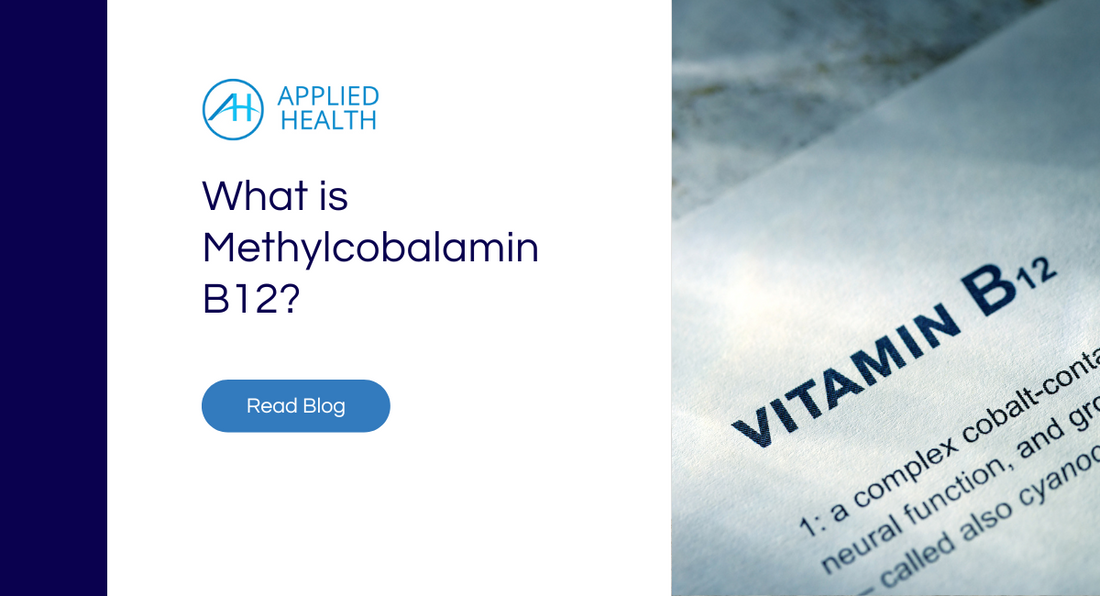What is Methylcobalamin B12 and Why is it Special?
Methylcobalamin B12, pronounced, “Meth-yl-co-bal-a-min”
Hard to say, harder to spell, but so good for you.
No need to correctly pronounce or spell this funny word. Methylcobalamin is not easily offended and will still benefit your health.
How about this one? Vit-a-min Bee-twelve. Yep. Vitamin B12. That was easy.
Methylcobalamin is an active coenzyme form of vitamin B12 that easily absorbs in the body to be used effectively right away.
Let’s share a bit about why methylcobalamin is a well-loved form of vitamin B12 and how it is different from a vitamin B12 counterpart — cyanocobalamin.
Cyanocobalamin vs. Methylcobalamin
The two most common forms of Vitamin B12 (cobalamin) are cyanocobalamin and methylcobalamin.
While both are beneficial forms of vitamin B12, cyanocobalamin requires a step-by-step conversion process in the body to be fully utilized. Cyanocobalamin must be enzymatically converted in the body into an active coenzyme form, such as S-adenosylcobalamin or methylcobalamin.
PROS:
-Supports healthy vitamin B12 levels
-Benefits healthy metabolism, blood cells, nervous system, and cognitive function
CONS:
-People with MTHFR gene have a difficult time converting this form in the body
-Synthetic version of vitamin B12
-Requires a step-by-step methylation process to be absorbed in the body
Methylcobalamin is the active coenzyme form of vitamin B12 that is naturally found in food. It is attached to a methyl group. The body quickly identifies with this form since it is accustomed to methylation processes. Methylcobalamin is often recommended for metabolic and therapeutic benefits not offered by other forms of vitamin B12.
PROS:
– Supports healthy vitamin B12 levels
– Benefits red blood cell formation and methylation reactions
– Assists brain and nervous system function and immune regulation
– Quickly absorbed in the body
– Pre-activated and does not need to be converted in the body
– People with MTHFR gene are able to utilize this version in the body
CONS:
– It may be more expensive in supplement form
More nutrition facts about Methylcobalamin
Supports other nutrients in the body
Methylcobalamin helps with the transfer of methyl groups as an essential cofactor for methionine synthase. This critical enzyme is required for healthy homocysteine levels. Methylcobalamin is also involved in the process that produces dopamine and serotonin to support a healthy mood.
Helps regenerate neurons
Methylcobalamin is a crucial donor of methyl groups to the myelin sheath that insulates nerve fibers and regenerates damaged neurons.
Improves nerve function and sensory
Methylcobalamin has been shown to improve sensation and other symptoms for people who have blood sugar imbalances. It may also lessen pain, numbness, or tingling.
Healthy homocysteine levels
A combination of methylcobalamin and folic acid can benefit the balance of homocysteine levels. Both folic acid and vitamin B12 are required for the remethylation pathway to regain and maintain normal activity.
Benefits children with autism
A growing body of evidence finds that children with autism may have nutrient deficits for many reasons. With its many benefits on the nervous system and methylation processes, Methylcobalamin is considered an essential nutrient for children with autism who may have impaired methylation chemistry and other compromised processes.
Methylcobalamin Indications
Methylcobalamin is taken the same way you take a vitamin B12 supplement. Many Complex B Vitamins contain this active form. It may be particularly useful for individuals with impaired methylation processes, including those with elevated homocysteine or neurological weaknesses.
Safety: Oral forms of vitamin B12 (cobalmin), including Methylcobalamin, have been shown to be safe and well tolerated. Current research suggests it is often as equally effective, more cost-effective, and better tolerated than intramuscular vitamin B12 injections.
Adverse Reactions: None Reported.
Contraindications: None Reported.
Drug Interactions: Vitamin B12 should be taken at different times of the day from tetracycline. Use of metformin for diabetes, acid-reducing medications for ulcers, and long-term treatment with phenobarbital or phenytoin for seizure disorders may interfere with the body’s ability to use vitamin B12.

